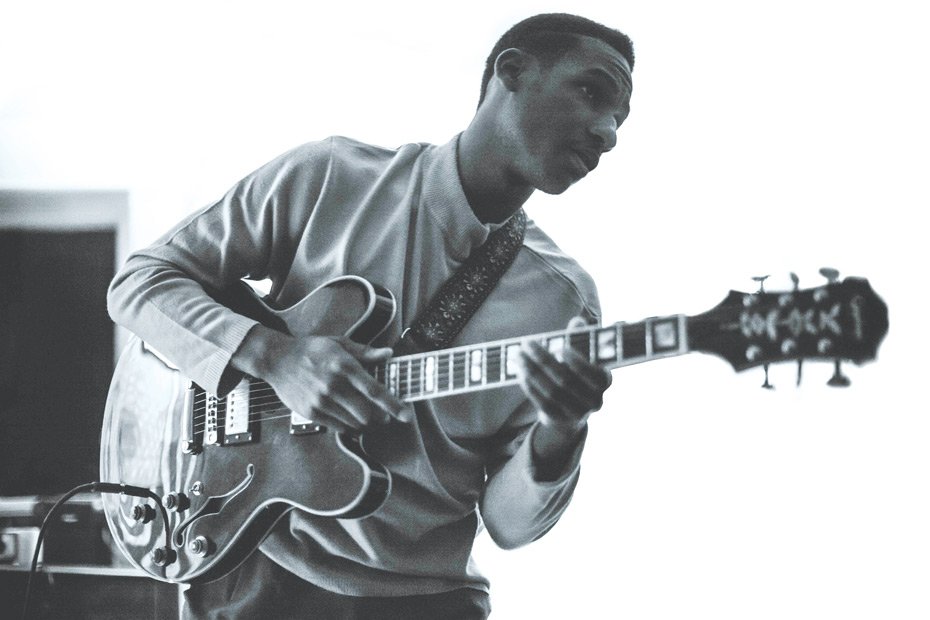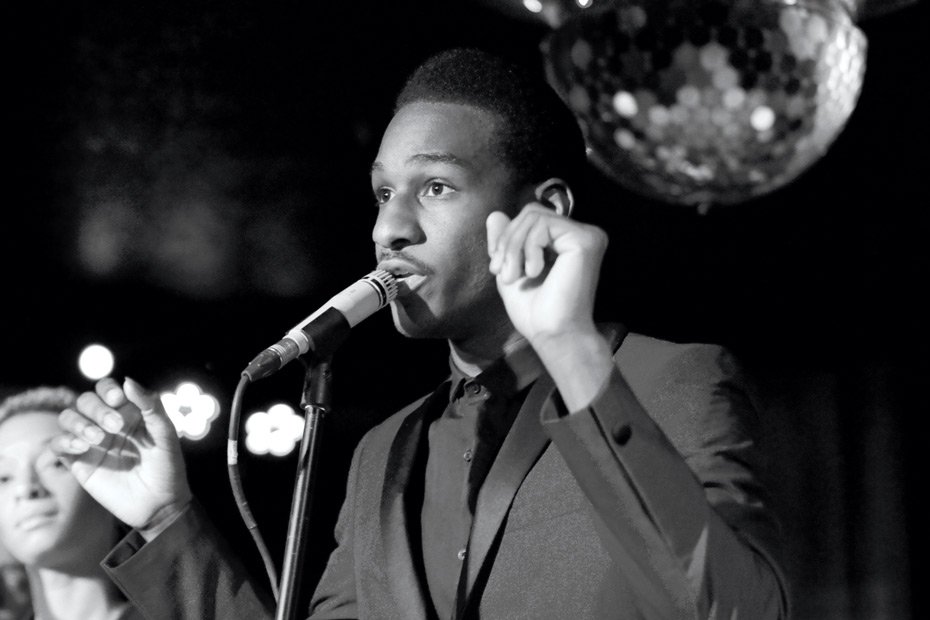Leon Bridges


If you’ve turned on the radio at all in the last six months, chances are, you’ve heard of Leon Bridges. If you haven’t, somehow, take a minute to question your life decisions and then go find him. Immediately. Bridges has blown up with his smooth voice and retro-soul songs reminiscent of the Golden Age, drawing instant comparisons to Sam Cooke, Otis Redding or Percy Sledge. Those comparisons are neither gratuitous nor fully accurate. His debut full-length album, Coming Home, hit the airwaves in late June, after slowly releasing tantalizing singles one at a time. Bridges at once sounds comfortably familiar while maintaining an element of freshness that stems from his unique song structures and buoyant fluidity.
Coming out of the Fort Worth area, Bridges spent his early musical years washing dishes and hitting as many open mics as possible before ultimately catching the ear of Austin Jenkins, from White Denim. The results are self-explanatory. Suffice it to say, Bridges no longer needs to worry about washing the dishes of strangers. Busy as he may be taking over the musical world, Bridges took a few minutes to talk with us about his meteoric rise, his writing style, and why he really doesn’t mind being compared to the veritable Mount Rushmore of soul men.
ELEVEN: You have a lot of really cool stuff happening right now. From what I can tell, it all started with a pair of Wranglers?
Leon Bridges: Yeah, it’s been happening. I’m excited with everything going on, excited with the record release–yeah, it’s all exciting times.
11: Can you talk a little bit about how you kicked things off? I was reading a little about how you initially met the guys from White Denim–what’s the background with that?
LB: I first met up with them at a little bar in Fort Worth, and when I met him, he didn’t tell me–he told me he played in a band, but he didn’t tell me what band it was–and so I found out a week later, at this place called the Magnolia Motor Lounge, when I was on stage, playing some of my solo songs, and he came in, and after I got done playing he was like, “man, we gotta make a record,” Right after he left the bar, my friend goes, “You know the guys in White Denim?” And I had never even heard of White Denim, so I went online and checked out the music. Austin [Jenkins] came up to me about making the record, afterward.
11: Some of the equipment you’ve been recording on is quite a bit older to kind of get that retro-style sound you’ve got. How important is that to you, the scene and the setting that you were making your music in?
LB: When Austin came and told me he wanted to record, I had never really thought of recording that way. Coming up in the scene–I didn’t have any money to record period, so I would have been thankful to have anybody offer some time for me to record, but getting in there and going through the process, I began to see that this is the way music should be recorded, and we just got some really good sound out of that equipment.
11: You can kind of tell when you listen to your stuff, it has a really warm feel to it. I guess aside from your voice, it seems like that’s where some of the comparisons you’re getting to some of the old soul guys is coming from–do you see that as well?
LB: Yes. I think it’s cool how you can hear some of the imperfections. You look at “The River,” and that was a take that I wasn’t totally happy with. It sounds like we’re rehearsing or something. It’s so raw, but it definitely speaks to the listener.
11: I was also wondering about some of your influences. I see that when you were in high school you were digging the neo-soul scene with guys like D’Angelo, Ginuwine and Usher and whatnot, and at some point you switched over, and I’m wondering how those influences have affected the music you’re making right now?
LB: For sure. My goal is to make timeless soul songs, but of course it’s still going to sound a little bit fresh and different because of my influences. But you know, I can’t deny that I didn’t grow up listening to Sam Cooke or Otis Redding, you know, I didn’t really find their music until two years ago or so.
11: I saw that you mentioned that in one of your older songs, “Lisa Sawyer,” you tried to adopt the phrasing that you picked up from hip hop into your writing style. Is that something that you still do consciously?
LB: I think in the beginning it was something that I was conscious of. Now, every now and then, I’ll be writing and I’ll think of phrasing that I heard in a certain hip hop song. But the funny thing is, even those old soul guys back in the ‘50s had the same phrasing, that’s where it all started. You look at Johnny Taylor or even Sam Cooke, and it’s like, wow, it’s really cool those guys were doing that back then.
11: There’s a lot of musicians you could sift through going back through when you start talking about those old soul guys. I’m kind of wondering how much time you’ve had to put in going back and digging in to those old catalogues. I imagine that’s a pretty tall task.
LB: I’m kind of a lazy person. I am. So in the beginning, I would kind of just haphazardly go listen to Sam Cooke or the Temptations, but I never really just dug in deep and went through all their records; it was just something where I went online and just looked stuff up. But when I set out to write at first, I took the little that I knew about it and tried to recreate it in my own way.
11: I was actually kind of curious about that, when you say “create it in your own way.” The music that you make is really interesting because on the one hand it sounds familiar and it harkens to that throwback sound, but on the other hand, it’s fresh, and I’m wondering what do you do? What’s your process? How do you get that mix?
LB: It’s something that just kind of comes out naturally. Of course, I’m always thinking of ideas and melodies and song structures that are different than what’s out there. If you look at anything different in the past–if you look at “Lisa Sawyer,” that structure is not something you would have heard back in the ‘50s and ‘60s in that it doesn’t really have a chorus, but it still reminds you of something you would have heard in the past.

11: I wanted to ask you a little about your community in the Fort Worth area. I know you’ve been out on tour, but it sounds like you’ve kind of made that area your home base.
LB: I mean, people ask me if I’m going to move or anything, but I look at Fort Worth as home to me. I get a warm feeling when I’m riding down the street in the neighborhood and reminisce all the times I was on those same streets when no one really knew about it. It was a time in my life when I was washing dishes, working, going to different open mics–just a more simple time. But it’s all coming up. There’s a really awesome community of songwriters–there wasn’t any soul musicians–but there are guys, I was aspiring to be a better writer because of them. I would look at some guys and they would be doing more like a Townes Van Zandt vibe, or a Bob Dylan vibe, and I loved that consistency. I would think to myself, you know, I want to be consistent like that, and so, I’m very thankful for the community.
11: I know a lot of your songs right now are kind of love songs, but I think one of the interesting things that you’re doing is that the way that you write, and the lyrics that you’re writing are pretty visceral. What comes first for you? Do you get melody, do you get the lyrics down, you get the chords–how do you put your music together?
LB: You know, with me, there are different situations. Sometimes, the song might start with the melody, or sometimes it starts with me messing around on the guitar and I come up with something I like. Sometimes I just kind of write some lyrics down and mold that into a melody. Of course, a lot of my songs are love songs, but I try to find ways to package it differently to make it fresh.
11: You were initially studying to be a dancer. Your music has a noticeable fluidity, but it’s also still fairly rhythmic. Is the way that you approach your music the same way you would approach maybe a piece of choreography or interaction?
LB: Hmm, I never really think of it when I’m writing, but one thing I did take from dance, and much love to my teachers –before I started dancing, I had only ever been on stage in high school, and I was nervous as crap for that. So being on stage when I started dancing, it helped me learn how to perform in front of people.
11: That makes sense. And dancing is a physical thing, so it forces you to kind of get out of your headspace.
LB: Yeah! And another thing is that, doing some of the jazz, and having to be a certain character, that really kind of grew my love for some of the classic styles.
11: You can’t avoid the comparisons that you get to Sam Cooke or the Valentinos. Do you like that? I know it’s flattering, but do you think that it’s something in the future you won’t have to be thinking about too much?
LB: Sure, yeah. The thing I don’t like is when people say, “Oh, it’s the next Sam Cooke,” because of my range or my voice, but I’m not anywhere near him like that. But I understand that, you know, people might make the comparison because it’s something classic and it’s something smooth, because Sam Cooke was different from a James Brown, and my music is very smooth, and soft, so I can see where they make the comparisons. But, it’s very evident that Sam Cooke is one of the biggest inspirations.
11: You’re going to be playing at Pickathon later in July–have you spent much time in the area?
LB: Yeah, I’ve been to Portland twice. I guess Texas is a little far from Portland, in terms of culture, but yeah, I’ve spent a little time. »
– Charles Trowbridge



